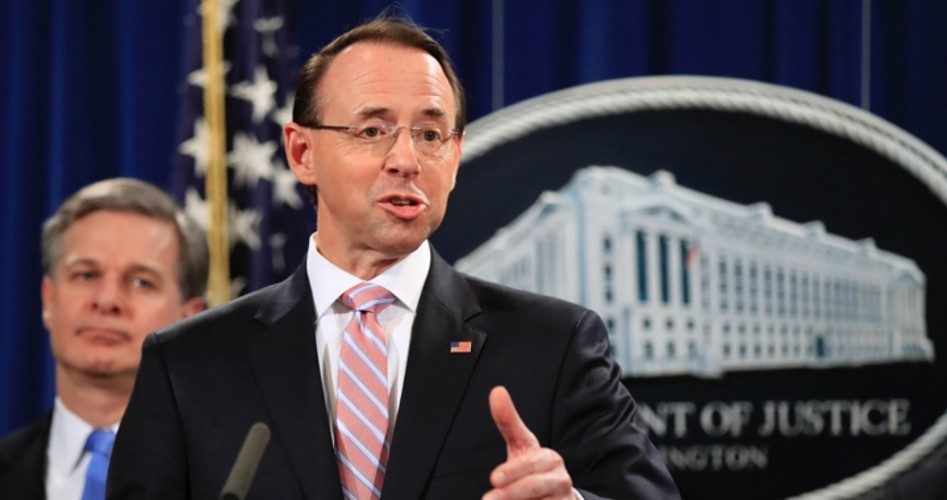
The Wall Street Journal reported on Wednesday that, based on information from a “person familiar with his thinking,” Deputy Attorney General Rod Rosenstein will shortly depart the Department of Justice, where he has served since 2017.
The Journal listed five reasons for his departure, each of them plausible, but leaving unreported a long list of real reasons.
First, said the Journal, Rosenstein “had long planned to hold the position for about two years.” Second, the arrival of a new attorney general — William Barr — “would be a logical time for him to depart.” Third, there appeared to be no evidence that he was being forced out, but, interestingly, Rosenstein didn’t say, or know, the exact date of his departure.
Fourth, the nomination of Barr was gained only by Barr’s obtaining assurance from the president that he would be able to name his own deputy to replace Rosenstein following his likely confirmation by the Senate. So, according to the Journal, Rosenstein was out the door in any event.
Finally, Barr had sent an unsolicited memo to the Justice Department last year saying that the Mueller investigation into Trump’s alleged obstruction of justice following his firing of Attorney General James Comey was based on a “fatally misconceived” theory. Thus, it was intimated, once Barr was confirmed by the Senate, Rosenstein would be fired anyway as part of the process of questioning the continued viability of the Mueller investigation. After all, it was Rosenstein who named Mueller to lead the investigation that has harassed the Trump administration ever since.
All of these, on the surface, appear to be reasonable and plausible reasons for Rosenstein to make his departure.
New York Times best-selling author Jerome Corsi offers many other reasons for Rosenstein’s departure. In his latest book, Killing the Deep State, Corsi provides evidence that there is much more behind these plausible explanations for Rosenstein’s indeterminate but likely departure in the next few weeks.
First, Rosenstein is an Obama holdover, which paints him with an anti-Trump brush for that fact alone. Second, Rosenstein never let a serious conflict of interest get in the way of his nominating Robert Mueller to investigate why the president fired Comey. As Corsi wrote:
Obsessed with the coverage of FBI Director Comey’s firing as obstruction of justice, the mainstream media and Deep State forces glossed over Deputy Attorney General Rod Rosenstein’s own conflict of interest in the case.
Rosenstein picked the prosecutor to investigate Comey’s firing even though Rosenstein himself played a central role in that firing [he provided the reasons for the president to fire Comey in a letter later used to justify it].
Next, Rosenstein and Mueller colluded in hiding hundreds of e-mails between Lisa Page and Peter Strzok “in order to hide from the public the amount of anti-Trump hatred there was at the head of the FBI and the DOJ during [Trump’s] election and afterward.”
Rosenstein’s part of the Deep State apparatus dates back to the Clinton years. As Corsi pointed out:
Rosenstein, Comey and Mueller all shared a history of working in the Department of Justice that traced back to the Clinton administration, with all three having worked on an FBI investigation that ultimately resulted in exonerating the Clintons from any wrongdoing — a history that stretched back to Whitewater, the real estate fraud that involved Hillary and Bill Clinton when Bill was an Arkansas governor and included … other Clinton scandals such as the Marc Rich pardon.
It was that history of collusion that led Rosenstein to appoint his good friend and partner in crime Robert Mueller as chief investigator into the Trump election campaign’s alleged collusion with Russia, giving Mueller unlimited powers to investigate anyone and everyone with even the slightest connection to Trump. Wrote Corsi:
Rosenstein, as acting attorney general — given Sessions’ decision to recuse himself in the Russian investigation — appointed [Mueller] to serve as special counsel, charged with investigating “any links and/or coordination between the Russian government and individuals associated with the campaign of Donald J. Trump.”
Rosenstein’s letter was so broad as to include “any matter” arising from the Russian collusion investigation.
There was Rosenstein’s suppression of the Russian bribery scheme to influence the Clinton administration into approving the sale of uranium reserves owned by Canadian company Uranium One to Russian company Rosatom. As Corsi noted, “The involvement of Rosenstein and Mueller in suppressing the Russian bribery scheme should be sufficient evidence to disqualify both from investigating President Trump.”
Add to this the report from the New York Times about Rosenstein’s threat to wear a wire so he could secretly tape conversations between himself and President Trump in order to entrap him, plus his suggestion to invoke the 25th Amendment to remove Trump from office, and one has all the evidence he needs to conclude that Rosenstein was disloyal, a bad actor, a deceiver, subversive, and a Deep State anti-Trump operative.
Once Rosenstein leaves — the last of the Obama holdovers — few will lament his exit.
Photo: AP Images
An Ivy League graduate and former investment advisor, Bob is a regular contributor to The New American magazine and blogs frequently at LightFromTheRight.com, primarily on economics and politics. He can be reached at [email protected].
Related article:



